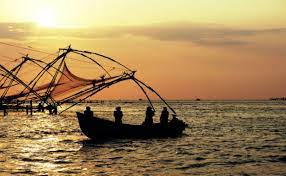
The naval authorities in Sri Lanka this week were drawing up plans to counter the increasing threat posed by Indian poachers on the Palk Straits after a naval patrol boat came under a hot water attack on the high seas earlier this week, a top most official said yesterday.
The attack took place during the early hours of the morning close to Point Pedro when the naval personnel had attempted to board a poaching Indian vessel.
“No one sustained any injuries in the attack but it has created a certain amount of anxiety among the navy personnel tasked with patrolling the Palk Straits to discourage Indian poachers.
However, irrespective of the attack the navy was able to arrest at least a dozen Indian poachers along with two fishing vessels.
This was followed with another arrest of six Indian poachers barely 48 hours after the incident”, the official said.
“The naval personnel on patrol crafts do not have orders to fire even warning shots at intruders and this, perhaps have encouraged the poachers to be more encouraged and activated.
The hot water attack is the first known incident to have taken place by the Indian poachers and therefore some counter action will have to be initiated at the very earliest within a diplomatic framework”, Navy Spokesman Captain Gayan Wickramasinghe said.
Some eight years ago two naval personnel were allegedly hacked to death by Indian poachers and their bodies were later dumped into the sea.
The two naval ratings had used an inflated dinghy to inspect a suspected Indian fishing vessel off the eastern seas when they were overpowered and murdered.
Having said that, the navy from the start of this year have rounded up 234 Indian fishermen along with 36 boats.
Meanwhile, the Chief Minister of the South Indian State of Tamil Nadu M. K. Stalin has called on Delhi to intervene with the Sri Lankan Government in a bid to release the Indian fishermen currently in custody.
In the past hundreds of Indian fishermen have been released from Sri Lankan jails following diplomatic maneuvers between the two countries.
For their part an unknown number of Sri Lankan fishermen have also been detained by the Indian authorities after they had strayed into the territorial waters of that country.
Hundreds if not thousands of Indian poachers are known to enter the country’s territorial waters on a regular basis where among other irregular methods of fishing they also resort to bottom trawling destroying the marine-eco life on the sea bed, northern fisher representatives have repeatedly warned.
The activities of the Indian poachers have also dwarfed the livelihood of the local fishermen who sometimes have to return home with empty nets, they have said.




